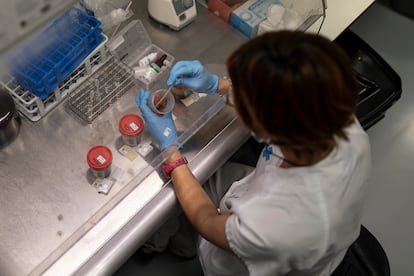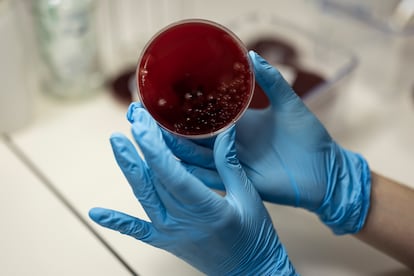The potential of fecal transplantation: Effective against an aggressive bacterium and promising in oncology
A scientific review concluded that fecal microbiota transplantation is more effective than antibiotics against recurrent ‘Clostridioides difficile’ infections; researchers are also investigating its possibilities in mental health and to improve the effect of immunotherapy in cancer

The human intestine is home to an ecosystem of millions of microbes, such as bacteria, viruses, fungi and archaea, that play a key role in our health. All of them, their genetic material, the substances they secrete and the relationships they establish with each other, make up the intestinal microbiome, a sort of invisible organ that interacts with the rest of the organism. If everything is in order and harmony, there is health. But when something in that microbial universe becomes destabilized — due to antibiotics or some pathogen, for example — problems appear.
The potential of the microbiome to mediate health and disease is still being studied, but some therapeutic strategies that prove its relevance for human well-being have already been found: fecal microbiota transplantation, which consists in using feces to implant the intestinal microbes of a healthy donor in the intestine of a patient in order to restore its damaged flora, is already used in clinical practice. According to a recently published scientific review, it is more effective than antibiotics in treating recurrent infection by the bacterium Clostridioides difficile, and could help with ulcerative colitis. However, the scientific community continues to refine this technique and look for new uses, such as in the field of mental health or to improve the effect of immunotherapy in cancer.
The idea of using feces and their microbes for therapeutic purposes is not new. In 4th-century China, the use of the so-called “yellow soup,” a fecal suspension that was used for the treatment of severe food poisoning and diarrhea, was described. Bedouins also consumed camel feces to treat dysentery, and German soldiers, during the North African campaign in World War II, were given intestinal bacteria for the same purpose.
It was during the 1980s when it began to be used to treat Clostridioides difficile infections, explains Jordi Guardiola, head of the Digestive System Service at the Hospital de Bellvitge in Barcelona, Spain, and one of those responsible for the Unit for the Study of the Microbiome there. “It is an infection that is closely linked to the use of antibiotics. It produces a profound dysbiosis [an alteration of the microbial balance]. C. difficile can form spores that live everywhere and last a long time. Surely we have been in contact with them, but nothing happens to healthy adults. By taking an antibiotic, however, it favors dysbiosis and the spores germinate, and with this imbalance there is a greater risk of the toxin producing inflammation,” he explains. Dysbiosis leads to the loss of microbial diversity: beneficial microorganisms disappear, making way for the spread of other potentially harmful ones.
Guardiola notes the paradox of using antibiotics to treat an infection that is fueled precisely by the use of these same drugs: “We treat a disease favored by antibiotics with more antibiotics: we kill the bacteria, but we cause more dysbiosis, which increases the risk of recurrence,” he points out. This highly resistant microbe can cause life-threatening diarrhea, and after the first infection, 30% of patients treated with antibiotics relapse; after the second episode, the probability of a third is 60%.
In clinical practice, fecal microbiota transplantation is already being used to treat this disease. Through methods such as colonoscopies, enemas, oral capsules or nasogastric tubes, the patient is administered fecal material containing intestinal microbiota from a healthy donor. This technique helps to restore the flora and increase microbial diversity. A study published in the New England Journal of Medicine in 2013 confirmed the resounding success: 93% of those who received the transplant were cured, while in the case of those who took an antibiotic, it was only 31%. “The study was stopped [early] because the benefit was very high,” recalls Guardiola.

A recent review carried out by Cochrane, the independent network of researchers analyzing the scientific evidence, concluded that fecal transplantation “probably leads to a larger increase in resolution of repeated infections of C. difficile than the other treatments studied,” such as vancomycin. Rosa del Campo, a microbiologist at the Ramón y Cajal Hospital in Madrid, Spain, applauds the result of the review, although this is nothing new for her. “It is administered from the third recurrence, and people accept it very well. However, our clinicians prefer to consider other options such as fidaxomicin [another antibiotic], because they think that we’re taking certain risks,” admits the microbiologist.
The jury is still out regarding the risks of this therapeutic strategy. In this case, the scientific review concludes that this technique “likely leads to a small decrease in serious side effects,” but the authors admit being concerned about the possibility of the transplant carrying pathogens that might cause unwanted side effects, and state that serious adverse events, including mortality, septic shock, aspiration pneumonia and toxic megacolon, have been reported. Del Campo is aware of the dangers, but notes that control measures are in place: “There are risks of [introducing] things that we don’t know about, but the donors are healthy and super-controlled people. Here in Spain we always have controls to detect antibiotic-resistant bacteria in feces,” she exemplifies.
Not everyone can be a donor. Profiles are meticulously monitored (“If you have high cholesterol, you’re rejected,” says Del Campo) and they are followed for a period of time to ensure that they continue to be healthy. There is no such thing as zero risk, but the danger of transmitting infections, for instance, does not worry the experts too much, Guardiola points out: “On the contrary: normalizing a microbiota makes you healthier, it prevents you from developing intestinal sepsis. What worries us now is that the predisposition to get sick is transferred. This is more theoretical, but, strictly speaking, if a donor develops a disease, the recipient must be monitored. We transfer a lot of things that we don’t know what they are.”
Microbiome research continues. Another Cochrane review of its role in inflammatory bowel disease (IBD) — an autoimmune condition that affects the gut in which the immune system mistakenly attacks healthy tissue — produced more mixed results: the researchers conclude that it “may increase the proportion of people with active ulcerative colitis [a type of IBD] who achieve control of the disease” but see “uncertain evidence about the risk of serious adverse events and improvement in quality of life.” It is also not clear whether it favors remission in patients with Crohn’s disease (another type of IBD) or the maintenance of remission in either of these two conditions.
No results in Crohn’s disease
“There is a clear association between dysbiosis and IBD, and this has led to the belief that if you normalize this imbalance, you can curb the disease. Most randomized studies on ulcerative colitis have been positive, but not all,” reflects Guardiola. Del Campo points out that, in order for it to work for colitis, they should not be long-term patients, as “in these cases the immune system is already so altered that even if you change the bacteria, the inflammation will not go away,” he explains. Regarding Crohn’s disease, the experts consulted agree, the situation is less definitive, “there is less data” and it does not quite work.
Fecal transplantation is also being studied for other uses besides intestinal pathologies, like recurrent urinary tract infections. “It is under study. The point is changing intestinal ecosystems in case uropathogens remain hidden there. The alternative is to take low-dose antibiotics every day of the year,” says Del Campo. Guardiola also mentions possibilities “for the prevention of sepsis in multi-resistant germs,” or for oncology: “There is a clear relationship between dysbiosis and the efficacy of immunotherapy, and trials are being carried out to improve cancer treatment,” he says. A small study published in Science showed that, in patients with metastatic melanoma, fecal transplantation was associated with “favorable changes” in immune cells and gene expression in the tumor microenvironment.
There are also some positive signs in mental health, related to the gut-brain axis, the bidirectional connection between both organs. In a patient with bipolar disorder, for example, Australian doctors achieved a reduction in symptoms after the transplant, ruling out a possible placebo effect: “[I] felt amazing, like a weight had been lifted off me. Like I’d caught my breath for the first time in years,” stated the patient after the intervention. A scientific review with human and preclinical studies also found “strong evidence for the treatment and transmission of psychiatric illnesses” through fecal microbiota transplants. “All studies found a decrease in depressive and anxiety-like symptoms and behaviors resulting from the transplantation of healthy microbiota. The inverse was also found, with the transmission of depressive and anxiety-like symptoms and behaviors resulting from the transplantation of microbiota from psychiatrically ill donors to healthy recipients,” wrote the authors.
The scientific community continues to research, also with well-characterized, laboratory-designed cocktails of bacteria, to control what is administered in the transplant, and in November, the US Food and Drug Administration approved the first prepackaged fecal microbiota biopharmaceutical to treat Clostridioides difficile. “Our real limitation is knowledge, the knowledge base that we lack,” admits Del Campo. Guardiola agrees: “We have a lot to learn. We have always been very cautious about the relationship between dysbiosis and disease: except for Clostridioides, causality has not been proven. And finding associations does not mean causation.”
Many questions remain to be answered. An article published in the Cell Host & Microbe magazine points out that even the mechanistic understanding of how fecal transplantation works for C. difficile is incomplete, and they do not know why this technique does not work in some patients. For example, they point out, ecological factors, such as the recipient’s diet or genetics, have not been taken into account in previous studies, “and may potentially be the missing links to these ‘failed’ fecal microbiota transplantation cases,” they reflect.
Sign up for our weekly newsletter to get more English-language news coverage from EL PAÍS USA Edition
Tu suscripción se está usando en otro dispositivo
¿Quieres añadir otro usuario a tu suscripción?
Si continúas leyendo en este dispositivo, no se podrá leer en el otro.
FlechaTu suscripción se está usando en otro dispositivo y solo puedes acceder a EL PAÍS desde un dispositivo a la vez.
Si quieres compartir tu cuenta, cambia tu suscripción a la modalidad Premium, así podrás añadir otro usuario. Cada uno accederá con su propia cuenta de email, lo que os permitirá personalizar vuestra experiencia en EL PAÍS.
¿Tienes una suscripción de empresa? Accede aquí para contratar más cuentas.
En el caso de no saber quién está usando tu cuenta, te recomendamos cambiar tu contraseña aquí.
Si decides continuar compartiendo tu cuenta, este mensaje se mostrará en tu dispositivo y en el de la otra persona que está usando tu cuenta de forma indefinida, afectando a tu experiencia de lectura. Puedes consultar aquí los términos y condiciones de la suscripción digital.









































